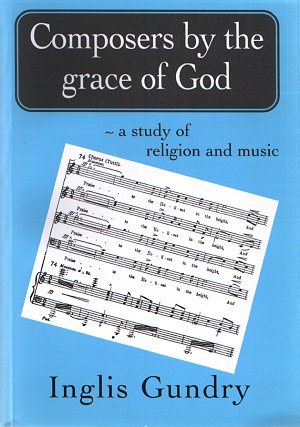
Although the sub-title of this book, "a study of religion and music", perhaps
gives the impression of an objective assessment of the subject, it seems
clear that the author himself by no means takes a wholly impartial stance.
He comes down firmly on the side of the relevance a religious belief has
on the inspiration and motivation a composer 'ought' to feel.
Its 270 or so pages certainly set out to be comprehensive: the thirty-two
chapters range from Music in the Old Testament, by way of the Coming of
Christianity, the Devil, Notre Dame, Monteverde, Purcell, Vivaldi, Bach,
and a whole host of greater and lesser composers down to Shostakovich and
Schoenberg. Thus it forms a kind of 'abridged Baedeker' of composers' and
their supposed or non-supposed. acknowledgement of the influence of religion
on their creative gifts. In many ways it is an interesting account, obviously
undertaken after considerable research and wide reading from earlier historical
sources. Some chapters are revealing, but others are less so, since the author
appears to have his preferences for this or that composer. somewhat to the
detriment of an objective assessment of those he does not particularly warm
to.
0f course, we all have our favourites, but the compiler of a guide cook of
this nature needs to be more objective. There is thus, a rather uneven quality
in the writing, and the suspicion grows on the reader that he is being preached
at instead of being allowed to make up his own mind, Far too easily he assumes
that a particular composer 'must' have felt this way or that way about religious
inspiration.
Some chapters are especially woolly in their exposition: 'Romanticism' and
'Nationalism' for instance. He also tends to expound at length various opera
plots (since his own first love is opera?) but, by comparison, has
less to say about the probable motivation or tantalising inspiration behind
abstract instrumental music: the sonata, string quartet, symphony or concerto
other than the obvious historical facts such as are well documented, for
example, about Shostakovich.
The literary style is faintly naive at times and there is often a tendency,
grasshopper-like. to go off in another direction for no apparent reason when
the reader could have wished for a more closely-reasoned explanation for
the original topic under discussion.
Despite some interesting historical information, collected from a wide variety
of sources, and being well marshalled; over all this book does not make for
compelling reading; its inclination to a partisan view ot the significance
of religion, and the occasional fervour of emotion this generates makes for
more than a little tedium.
Reviewer
Arthur Butterworth
Visit the Inglis Gundry Web site

